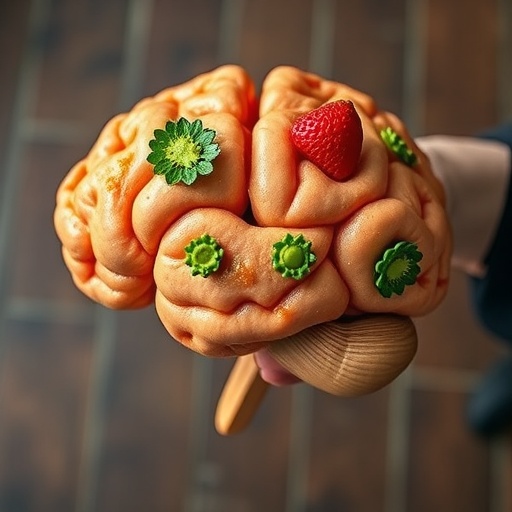A pioneering investigation at the University of Arizona College of Medicine – Tucson is set to explore the profound influences of maternal nutrition on offspring’s lifelong food preferences, backed by a prestigious National Institutes of Health (NIH) New Innovator Award. This five-year, $1.5 million grant supports high-risk, high-reward scientific endeavors, recognizing the innovative potential in early-career researchers. At the helm is assistant professor of physiology M. Maya Kaelberer, whose work delves into the intricate dialogue between the gut and brain, focusing on specialized intestinal cells known as neuropods. These cells convey vital nutritional signals from the gut to the brain’s reward centers through the vagus nerve, orchestrating complex behavioral outcomes, including dietary choices.
The gut-brain axis has emerged as a critical pathway through which the digestive system modulates physiological and behavioral responses. Neuropods, sensory cells embedded within the lining of the large intestine, act as neuroendocrine communicators. Kaelberer’s prior research has illuminated the role of neuropods in translating nutrient stimuli into neural signals, challenging conventional understanding that focused predominantly on systemic hormonal feedback. This neurological channel offers a novel window into how dietary inputs may be encoded during development to influence future eating behaviors and metabolic health.
Building on foundational studies that demonstrated maternal consumption of high-fat and high-sugar diets predisposes mouse offspring to obesity, Kaelberer proposes a nuanced inquiry into “nutritional memory.” By providing pregnant mice access to sweetened condensed milk alongside regular chow—mimicking human patterns of supplemental dietary indulgence—she aims to decode how prenatal nutrition calibrates the gut’s sensory apparatus. The central hypothesis posits that in utero exposure to energy-dense, palatable nutrients wires the offspring’s neuropods to demand richer calorie sources, shaping long-term preferences that tilt toward unhealthy diets.
This research transcends simple cause-effect paradigms by replicating naturalistic feeding environments rather than imposing artificial dietary restrictions. It acknowledges the human tendency for dietary supplementation through “junk” foods, despite availability of healthier alternatives. The experimental design seeks to mirror this complexity, providing critical insights into how the sensory nervous system in the gastrointestinal tract acquires and retains information about nutrient availability, possibly creating a persistent “set point” for caloric intake regulation.
Kaelberer’s work may redefine the role of the gut as not merely a passive digestive organ but a dynamic sensory network encoding nutrient signals that dictate behavior. She envisions that elucidating the interplay between maternal diet and offspring gut-brain signaling could unlock personalized nutritional interventions capable of mitigating diet-induced diseases. By understanding how neuropods respond to and remember specific macronutrients like fats and sugars, scientists might one day tailor diets that align with an individual’s programmed sensory preferences, enhancing adherence and health outcomes.
One of the more speculative yet transformative goals is the concept of “reprogramming” the gut at a cellular level. Kaelberer’s prior identification of long-lived neuropods capable of storing nutrient memory suggests these cells could be strategic targets for therapeutic manipulation. Removing or modulating these persistent sensory cells in mouse models may reveal pathways to alter food preference behaviors, offering hope for future pharmacological interventions designed to redirect human dietary choices toward healthier alternatives.
The complexity of this research lies in decoding the cellular and molecular mechanisms by which neuropods detect a variety of nutrients beyond fat and sugar, including proteins and micronutrients, and transmit this information to the neural circuits governing appetite and reward. This sensory integration likely involves specialized receptor expression, neurotransmitter release, and synaptic plasticity, which remain to be fully characterized. Such insights could fundamentally alter understanding of how prenatal environmental factors program long-term metabolic trajectories via neural pathways.
Kaelberer’s approach integrates sensory neuroscience with nutritional physiology, bridging disciplines to tackle one of the most stubborn public health challenges: diet-related diseases. Though substantial advances have been made in identifying dietary risk factors, interventions targeting the sensory and neural underpinnings of eating behavior remain scarce. This research could pioneer strategies for breaking entrenched dietary habits by modulating gut sensory cells, potentially leading to more effective obesity and diabetes prevention.
The implications of this work are profound. If early life nutrient exposures shape the gut’s sensory architecture, which in turn influences dietary preferences, then maternal nutrition emerges as a pivotal determinant of population health trends. This perspective compels a reconsideration of prenatal care guidelines, emphasizing not only caloric sufficiency but also the sensory quality of maternal diets to promote healthier offspring outcomes.
Additionally, the possibility of developing drugs that selectively target long-lived neuropods to rewire dietary preferences offers a futuristic yet plausible avenue for intervention. Such treatments could reduce the global burden of diet-related diseases by addressing the neural basis of maladaptive eating, an approach that current behavioral or nutritional therapies do not adequately encompass.
Kaelberer’s research also challenges existing dietary recommendations by proposing that nutrient sensory memory must be accounted for to create sustainable, palatable diet plans. Rather than imposing strict restrictions that often lead to poor compliance, personalized nutrition informed by gut-brain communication could offer nuanced solutions, providing alternatives that satisfy sensory expectations while supporting health.
Ultimately, this research embodies a bold attempt to translate sensory and cellular neuroscience into practical nutritional strategies. By unraveling how maternal diet shapes offspring neuropod function and food preferences, Kaelberer’s work may inaugurate a new era in nutrition science—one that recognizes the gut’s active role in encoding nutrient value and guiding lifelong eating behavior.
Subject of Research: Influence of maternal diet on offspring food preferences mediated by gut-brain signaling through neuropods
Article Title: [Not provided in source content]
News Publication Date: [Not provided in source content]
Web References: https://medicine.arizona.edu/; https://research.arizona.edu/news/gut-sense-connecting-large-intestine-brain-could-help-regulate-appetite
References: [Not provided in source content]
Image Credits: Photo by Noelle Haro-Gomez, University of Arizona Health Sciences Office of Communications
Keywords: Pregnancy, Nutrition, Nutritional physiology, Infants, Dietetics
Tags: dietary inputs and eating behaviorsgut-brain axis in dietary choiceshigh-risk scientific research fundinginfluence of early nutrition on metabolisminnovative research in physiologyM. Maya Kaelberer researchmaternal nutrition and offspring food preferencesneuroendocrine communication in the gutNIH grant for nutritional memory researchrole of neuropods in nutrition signalingunderstanding food choices through neuroscience.University of Arizona College of Medicine





